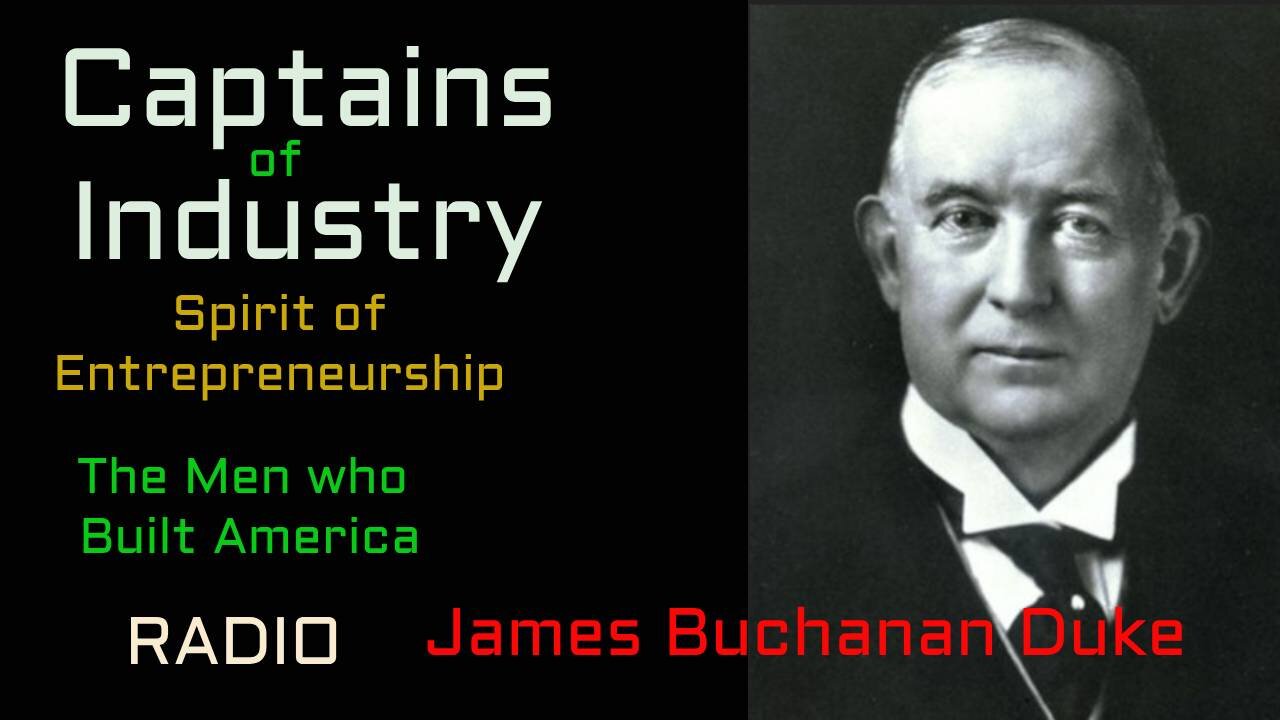Premium Only Content

Captains of Industry (ep23) James Buchanan Duke
James Buchanan Duke (December 23, 1856 – October 10, 1925) was an American tobacco and electric power industrialist best known for the introduction of modern cigarette manufacture and marketing,[1] and his involvement with Duke University. He was the founder of the American Tobacco Company in 1890.
Early life
James Buchanan Duke, known by the nickname "Buck", was born on December 23, 1856, near Durham, North Carolina, to tobacco manufacturer, philanthropist, and benefactor of Duke University, Washington Duke (1820–1905), and his second wife, Artelia Roney.
Business career
Duke's father, Washington, had owned a tobacco company that his sons James and Benjamin (1855–1929) took over in the 1880s. In 1885, James Buchanan Duke acquired a license to use the first automated cigarette making machine (invented by James Albert Bonsack), and by 1890, Duke supplied 40 percent of the American cigarette market (then known as pre-rolled tobacco). In that year, Duke consolidated control of his four major competitors under one corporate entity, the American Tobacco Company, which was a monopoly as he controlled over 90 percent of the American cigarette market. His aggressive business tactics in cutting prices paid to tobacco farmers directly led to the Black Patch Tobacco Wars in 1906–1908.
James B. Duke House on Fifth Avenue, New York, as seen in 2010
At the start of the 1900s, Duke tried to conquer the British market as he had done the American, eventually forcing the then divided British manufacturers to merge into the Imperial Tobacco Company of Great Britain and Ireland, Ltd (Imperial Tobacco). After two years of intense competition in Great Britain, Imperial Tobacco took the fight to the U.S. market, forcing American Tobacco to look for a settlement. This resulted in an agreement whereby American Tobacco controlled the American trade, Imperial Tobacco controlled the trade in the British territories, and a third, cooperative venture named the British-American Tobacco Company was set up between the two to control the sale of tobacco in the rest of the world.
During this time, Duke was repeatedly sued by business partners and shareholders. In 1906, the American Tobacco Company was found guilty of antitrust violations, and was ordered to be split into four separate companies: American Tobacco Company, Liggett & Myers, R. J. Reynolds, and the P. Lorillard Company. In 1911, the U.S. Supreme Court upheld an order breaking up the American Tobacco Company's monopoly. The company was then divided into several smaller enterprises, of which only the British-American Tobacco Company remained in Duke's control.
In 1892, the Dukes opened their first textile firm in Durham, North Carolina, which was run by Buck's brother Benjamin. At the turn of the century, Buck organized the American Development Company to acquire land and water rights on the Catawba River. In 1904, he established the Catawba Power Company and the following year he and his brother founded the Southern Power Company, which became known as Duke Power, the precursor to the Duke Energy conglomerate. The company supplied electrical power to the Dukes' textile factory and within two decades, their power facilities had been greatly expanded and they were supplying electricity to more than 300 cotton mills and other industrial companies. Duke Power established an electrical grid that supplied cities and towns in the Piedmont Region of North and South Carolina. Lake James, a power-generating reservoir in Western North Carolina, was created by the company in 1928 and named in Duke's honor. Buck Steam Station in Rowan County, North Carolina, built in 1926, was also named for Duke.
Pulitzer. Tiffany. Vanderbilt. Westinghouse. All names you may recognize but what do they have in common? They were all late 19th and early 20th century business men who were very successful, most of them making millions.
In the 1930s, as the United States and Canada were beginning the early stages of recovery from the Depression, Atlas Radio Corporation of Canada created the show Captains of Industry. The purpose of the show was to inspire people with the stories of these self-made men.
The show dramatized the lives of these men who were not just businessmen but philanthropists. The 15-minute shows highlighted the spirit of entrepreneurship each of these men possessed and the good things they did with their money. Over the course of the show, 52 North American businessmen were profiled.
-
 30:44
30:44
The Pascal Show
7 hours ago $0.01 earned‘I Was a Regular at the Freak Offs!’ — Adult Star Testifies in Diddy Trial
1.76K -
 1:38:21
1:38:21
TruthStream with Joe and Scott
1 day agoC R Stewart Author of the Britfield book series live 6/26 3pm pacific 6pm Eastern
4.48K1 -
 2:03:51
2:03:51
Inverted World Live
6 hours agoHypersonic Orbs Over New York | Ep. 66
66.3K24 -
 3:09:47
3:09:47
TimcastIRL
7 hours agoGOP Rep Demands Citizenship STRIPPED From Dems Zohran Mamdani, NYC Mayor | Timcast IRL
416K230 -
 1:21:31
1:21:31
Man in America
12 hours agoTech CEO Exposes the Diabolical Plan to ENSLAVE Us Through Smartphones
37.9K28 -
 9:53
9:53
MattMorseTV
15 hours ago $18.51 earnedCNN just made a FATAL MISTAKE.
39.6K53 -
 3:38:20
3:38:20
Alex Zedra
6 hours agoLIVE! Playing CoD
21.2K5 -
 15:23
15:23
Mrgunsngear
15 hours ago $4.17 earnedSig Sauer Enclosed Sig Loc Romeo-X Compact Red Dot Torture Test & Review
49.1K4 -
 3:05:54
3:05:54
Mally_Mouse
12 hours agoThrowback Thursday! Let's Play: Epic Mickey (Part 7 - final Good Ending)
24.4K3 -
 9:51:29
9:51:29
RalliedLIVE
14 hours ago $9.76 earnedSHOTTY BOYS VS WARZONE
159K2